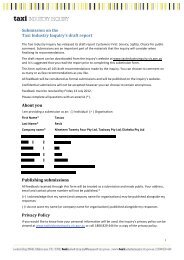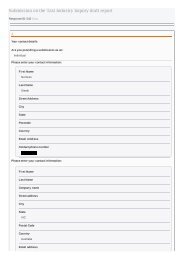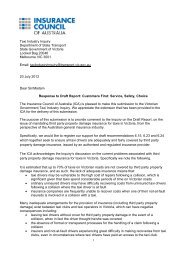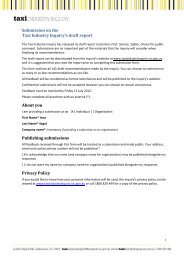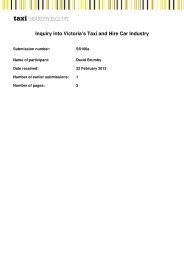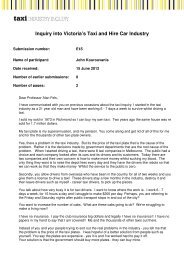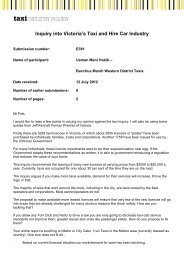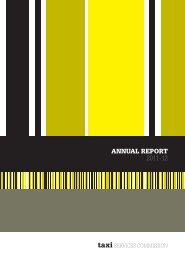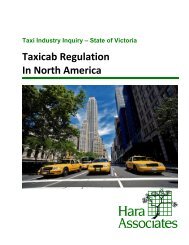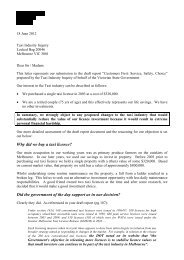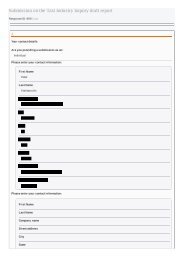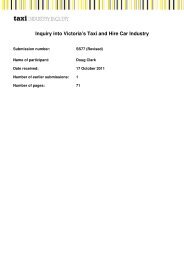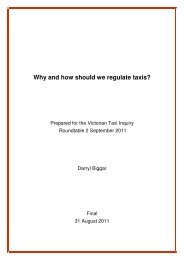Part D â Understanding and improving industry performance (PDF ...
Part D â Understanding and improving industry performance (PDF ...
Part D â Understanding and improving industry performance (PDF ...
Create successful ePaper yourself
Turn your PDF publications into a flip-book with our unique Google optimized e-Paper software.
Metropolitan NSPs charge affiliation fees per 28 day<br />
period <strong>and</strong> that the same fee is generally charged without<br />
reference to the licence type or how many booked jobs<br />
are taken. For example, peak service taxis are charged<br />
the same fee as a 24-hour taxi, despite being only<br />
permitted to operate for up to 16 hours per day.<br />
Regional NSP fees are understood to be more expensive<br />
because those smaller networks have fixed costs that<br />
must be shared by fewer affiliates. Platinum Taxis on the<br />
other h<strong>and</strong> is believed to have kept fees below market<br />
rates as part of its strategy to attract new operators.<br />
Costs associated with the running of large NSPs are<br />
understood to be largely fixed costs: that is, costs that do<br />
not vary with output. These costs include the cost of IT<br />
<strong>and</strong> telecommunications infrastructure. This means that<br />
there are some economies of scale associated with NSP<br />
operation, as the owner of Silver Top Taxis explains:<br />
The attractiveness of the services that a particular<br />
network service provider offers to taxi drivers <strong>and</strong> end<br />
users tends to increase with the number of taxis<br />
affiliated with, <strong>and</strong> users of, that network. The<br />
communication systems that are used to operate also<br />
exhibit economies of scale to a certain degree. For<br />
these reasons, it is an expected (<strong>and</strong> efficient)<br />
economic outcome that the provision of network<br />
service provider services will naturally gravitate<br />
towards a relatively small number of providers. 60<br />
The variance in prices for network services between<br />
metropolitan <strong>and</strong> regional areas demonstrates this<br />
economy of scale to some extent. However, taxi<br />
operators have advised the inquiry that prices for network<br />
services in Melbourne have continued to increase<br />
annually above the rate of CPI for the last 10 years, with<br />
affiliation fees having risen around 15 per cent above<br />
the rate of CPI over this period. It is notable that, during<br />
this period, more than 1,100 additional licences were<br />
released into the metropolitan Melbourne market, which<br />
should have further assisted NSPs to achieve greater<br />
economies of scale, fund new infrastructure <strong>and</strong> maintain<br />
or even reduce fees to affiliates. Based on today’s fees,<br />
the additional licences alone have resulted in NSPs<br />
enjoying a share of additional annual affiliation revenue in<br />
the order of $7.7 million.<br />
The inquiry considers that while economies of scale<br />
may have been achieved by the progressive mergers of<br />
smaller suburban networks <strong>and</strong> the growth in number of<br />
operators, it is possible that the benefits have not been<br />
passed on to operators by way of lower affiliation fees.<br />
The Essential Services Commission noted in its<br />
submission:<br />
A number of factors suggest that NSPs are in a<br />
position to charge excessive affiliation fees. 61<br />
The ESC contends that these fees may be less than<br />
efficient because they are likely to contain an element<br />
of monopoly rent due to there being few competing<br />
networks in any given taxi area. The ESC’s view is<br />
supported by these observations regarding increases in<br />
fees in recent years.<br />
The relatively large size of the Melbourne networks by<br />
comparison with networks in other Australian capital<br />
cities suggests that relatively low network service fees in<br />
Melbourne could be expected. However, the affiliation fees<br />
of the major Melbourne NSPs appear to be comparable<br />
with similar networks across Australia, with Melbourne fees<br />
only slightly below the average. Since networks in other<br />
jurisdictions also have dominant market positions, it cannot<br />
be claimed that this demonstrates that the Melbourne<br />
network service fees are not excessive.<br />
Despite the apparent comparative cost of monthly<br />
affiliation fees across Australia, the cost of affiliation in<br />
Melbourne does appear to be disproportionately high<br />
when measured by the number of jobs dispatched<br />
to taxis. This further suggests that the economies of<br />
scale that have been achieved by Melbourne networks<br />
are not being passed on to their affiliates. Figure 11.7<br />
demonstrates that the cost of affiliation when measured<br />
per booked job is $4.10 for Melbourne while Sydney is<br />
almost half the cost at $2.20.<br />
60 Gange Corporation, Op.Cit., p.5<br />
61 Essential Services Commission, Op.Cit., p.13<br />
<strong>Underst<strong>and</strong>ing</strong> <strong>industry</strong> <strong>performance</strong> CUSTOMERS FIRST 245



